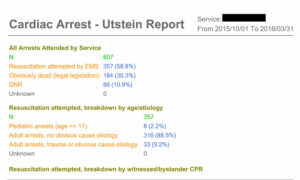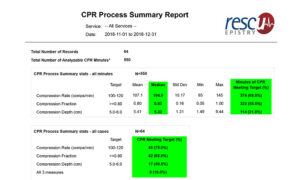CanROC is made possible through strong relationships between healthcare providers, researchers, and educators. The paramedics and firefighters that respond to and treat cardiac arrest patients form the cornerstone of the CanROC network. Without your support none of this would be possible, and we are always looking for ways to include and engage new emergency responders.
What are the benefits of participating in CanROC?
The first mandate and primary benefit of CanROC is the improvement of patient outcomes for all Canadians. CanROC helps our collaborating partners achieve this through two primary mechanisms: the advancement of prehospital resuscitation science, and ongoing focus on continuous quality improvement.
- Participating services have access to reporting tools. Reports provide a breakdown of various performance metrics related to response and patient care, patient demographics, and outcomes.
- CanROC works with training/education and CQI departments to provide data to help guide continuing medical education programs and highlight gaps in care where services can improve.
- For some regions, feedback may be available upon request or as part of service-led initiatives. This feedback may include information on patient outcomes and key performance metrics; past studies have shown that monitoring and feedback is an important tool for improving quality of care. Sites and agencies may benchmark against Canadian average metrics as a means to understand their own performance, areas where they excel, and opportunities for improvement.
- CanROC is a network of emergency services, academic institutions and health organizations working together. By participating in CanROC each member organization gains access to a large network of like-minded professionals that can collaborate to share best practices across Canada to improve resuscitative care as an entire country.
How can our service become a CanROC site?
There is an application process and site-specific requirements to be met in order to join CanROC. If you represent a service that would like to get involved, you can Contact Us to initiate the process. In order to join, the following requirements must be met (CanROC personnel can help provide clarification):
- Population > 200 000, or entire province/territory, or join existing site
- Joint letter identifying and confirming commitment to participate including:
- Research Institution (university or hospital)
- EMS/Fire Medical Director
- EMS/Fire Service Chief
- Commit to collect 100% of cardiac arrest in a web-based data entry portal
- Commitment to providing resources for ongoing participation
How can I get involved as an independent responder?
We welcome the participation of paramedics, firefighters and other first responders. For anyone in a CanROC agency, there is an opportunity to get involved in the EMS Committee, a group which represents the voice of front-line workers in all CanROC operations. For more information on this and other committees, see our Governance. There is also the potential to work with a CanROC sponsor to perform various research activities. For further details, refer to our writing group policy.
Since CanROC is so heavily focused on the field, we also welcome front-line responders to help champion our cause amongst their peers. We are happy to answer questions and provide information to enthusiastic collaborators who can communicate CanROC’s vision and spread awareness of our current projects and operations.
Finally, CanROC’s primary focus is on the public. This means we encourage each and every Canadian resident or citizen to get involved. Even if you are a professional medical responder we welcome you to engage the CanROC Public Engagement Committee for more ways you can get involved.
What type of work is CanROC currently doing?
CanROC is actively collecting cardiac arrest data from several sites across Canada and continuing its expansion to areas not yet currently contributing data. The registry is a data collection and analysis platform aimed at capturing 100% of all cardiac arrest patients across our sites. Each CanROC committee is also working towards proposals for interventional studies.


